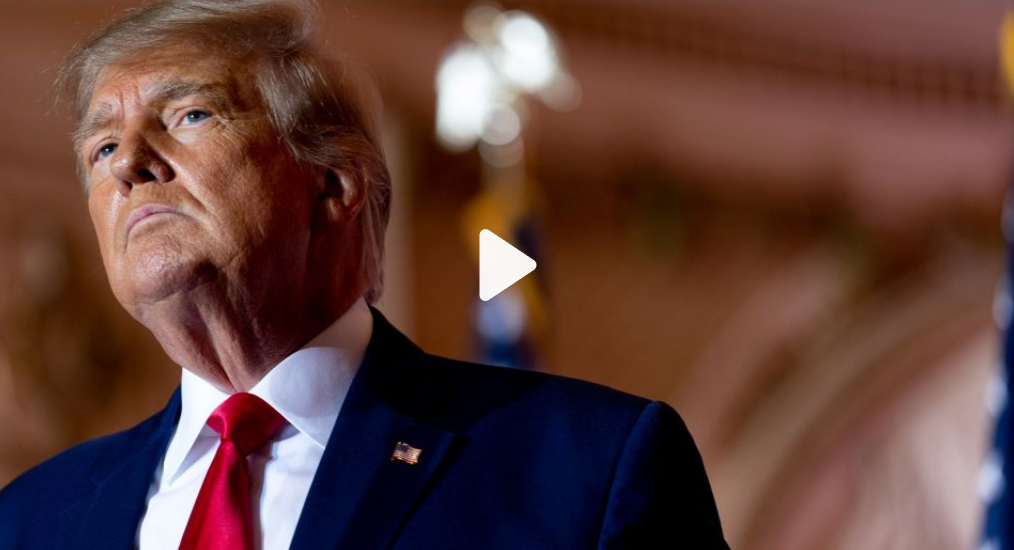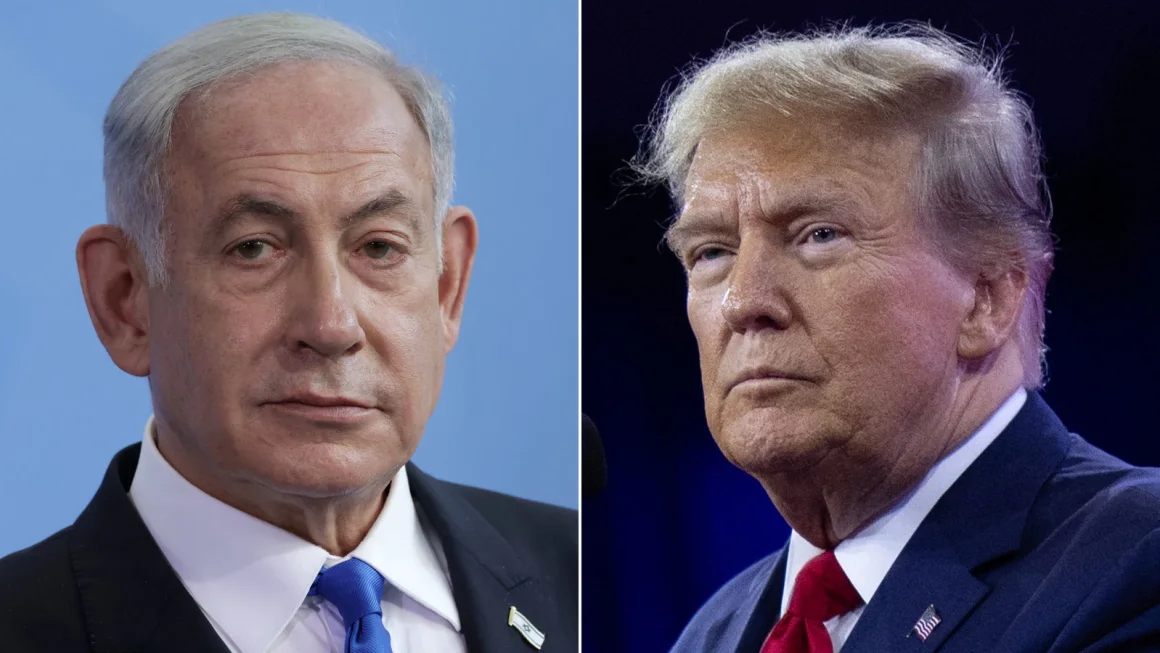America’s new rulers are putting on a show of intent and unity as Donald Trump turns from his so-far-successful rescue of Pete Hegseth to three more of his provocative Cabinet choices.
The complex dynamics driving the most empowered presidential transition in modern history went public Saturday as the president-elect presided over his political clan at the Army vs. Navy football game beside his pick to lead the Pentagon.
The event — which was the latest show of Republican dominance that will steer America on a vastly different path within a few weeks — brought together the president-elect, Vice President-elect JD Vance, House Speaker Mike Johnson and incoming Senate Majority Leader John Thune.
With Hegseth on hand, Trump made a firm statement about his desire to see his embattled pick confirmed after the former Fox News anchor rode out an initial storm over alleged transgressions in his past that he has denied. Tulsi Gabbard, whom Trump has chosen for director of national intelligence, also stood close to Trump — in a sign he doesn’t care about reservations that some Republican senators harbor about her attitude toward Russia and Syria.
It was perhaps the most visible showing of power football hosted in the Washington area since late Redskins owner Jack Kent Cooke corralled the politically connected, rich and famous in his box at RFK stadium in the 1980s and 1990s. When Trump, Vance and the congressional leaders — as well as the ubiquitous Elon Musk — peered over the loudly welcoming crowd and waved, the country’s new establishment looked almost like a politburo of the MAGA movement.
There was, however, no sighting of Robert F. Kennedy Jr., Trump’s pick to run the Health and Human Services Department. His past skepticism of child vaccines that have saved millions of American lives could make him the next Trump Cabinet selection to face a political storm on Capitol Hill, with meetings expected with senators this week.
The attendance of Republican congressional leaders was significant. Johnson, who hitched his wagon to Trump early in his tenure, has been rewarded with the president-elect’s patronage but faces a tough job in shepherding the new administration’s hardline agenda through a tiny House majority. And Thune may have one of the hardest jobs in Washington in piloting controversial nominees through the Senate and preserving the chamber’s, albeit rather eroded, prerogative to check likely power grabs by a new president who knows no limits.
Musk hovered just over Trump’s shoulder, personifying the extraordinary entry into the president-elect’s inner circle of the world’s richest man and one of its most influential sources of non-state power. The SpaceX pioneer’s presence is a reminder of the massive conflicts of interests likely to permeate the new administration.
Becoming a president in all but name
Trump’s appearance at the game Saturday was the latest photo-op in a remarkable process in which the former and future president has been assuming power as the current commander in chief, Joe Biden, fades from the scene ahead of his last Christmas in the White House.
So far, Trump has had only one major reversal — the loss of his first attorney general pick, Matt Gaetz, and has been effectively taking control of future US foreign policy by initiating trade showdowns with Mexico and Canada, meeting world leaders and striding back onto the world stage with a trip to Paris.
Trump’s controversial Cabinet choices are a show of defiance against a political establishment he believes thwarted his most aggressive instincts during his first term. And his refusal to abandon Hegseth – and support for Gabbard, Kennedy Jr. and FBI critic Kash Patel to lead the bureau – is an uncompromising omen about the administration that will begin next month.
“Donald Trump won. He won overwhelmingly. He said what he was going to do, and that’s what he’s doing,” retiring Sen. Mitt Romney, a longtime Trump critic, told CNN’s Jake Tapper in an interview that aired on “State of the Union” on Sunday. “This is a team of people who are very, very different, extraordinarily different backgrounds, different perspectives on issues, in some cases, I think even than the president, so an unusual collection of individuals, not the people I would have chosen,” the Utah Republican said.
As Washington gears up for contentious confirmation hearings in January, Romney warned that the Senate has a responsibility to ensure that there is no “skeleton” haunting Cabinet picks that could embarrass the country. But in a sign of the populist transformation of the GOP, Romney – the defeated 2012 presidential nominee – won’t be in the Senate to play that role.
Will Trump deploy the Hegseth playbook on Gabbard, Patel and Kennedy?
Trump’s team is increasingly confident after the furor diminished around Hegseth, who faces a sexual assault allegation, which he denies, and concerns over his past drinking, which he insists is not a problem. The Iraq and Afghanistan war veteran is pledging to shake up race and gender diversity programs in the Pentagon if confirmed. His chances look far healthier now than a few weeks ago, after public endorsements by Trump and a conservative media pressure campaign on Republican senators like Iowa’s Joni Ernst, who registered early disquiet about his selection.
“I think he made it through the gauntlet, I think he stood in, he fought, he defended himself,” senior Trump adviser Jason Miller told Newsmax on Friday, listing the kind of qualities that the president-elect reputedly likes to see in his Cabinet picks.
South Carolina Republican Sen. Lindsey Graham said Sunday that Hegseth had told him he would release from a confidentiality agreement a woman who accused him of a 2017 sexual assault in which charges were never filed. Graham said on NBC’s “Meet the Press” that anyone who had a complaint to make should “come forward.” Hegseth’s lawyer, Tim Parlatore, told CNN’s Kaitlan Collins this month that anyone who did make allegations against his client “would do it at her own peril of a further defamation lawsuit.” CNN has reached out to Trump’s transition team for comment.
But attention is turning to Trump’s other picks, and Kennedy is facing a new flare-up over his past vaccine skepticism. Outgoing Senate Republican leader Mitch McConnell warned Friday that anyone seeking Senate confirmation should avoid “appearance of association with” efforts to discredit proven medical cures. The statement, which did not mention Kennedy by name, was especially poignant since the Kentucky senator suffered from polio as a child and still lives with complications — a fact that was widely noted after he suffered a fall last week.
McConnell’s warning was not an empty threat. It would take only four Republicans to block Kennedy’s nomination, assuming all Democrats oppose, and the long-time leader’s stature and personal story might offer other senators cover. Kennedy’s past attacks on some vaccines are also coming into focus after The New York Times reported that one of his associates, lawyer Aaron Siri, filed a petition with the US Food and Drug Administration to revoke approval of the polio vaccine used in the United States. Siri made the petition on behalf of the Informed Consent Action Network, or ICAN, a nonprofit that challenges the safety of vaccines and vaccine mandates. He has been working with Kennedy to choose officials to serve in the incoming administration. CNN has reached out to ICAN and the Trump transition.
Trump praised the polio vaccine in a “Meet the Press” interview on NBC last week as “the greatest thing” and said someone would have to work very hard to get him to revoke it. But the president-elect also said in a Time magazine interview conducted in late November and published last week that he’d hold a “big discussion” about the rising rate of autism diagnoses and would consider getting rid of some vaccines for children. Scientists have repeatedly debunked the theory that vaccines cause autism. But despite that evidence, many anti-vaccine advocates have called for greater research into the subject.
In a letter to the Senate on Sunday, a group boosting Kennedy touted his support from hundreds of doctors. “His unwavering commitment to scientific transparency and his determination to address the root causes of illness make him uniquely qualified to lead HHS,” read the letter, which was released by Make American Healthy Again Action and was signed by the likes of Dr. Mehmet Oz, Trump’s pick to lead the Centers for Medicare & Medicaid Services.
The Kennedy selection reflects Trump’s fondness for contrarianism, and willingness to mock the consensus of the Washington health and political establishments. It fits into a pattern of elevating well-known skeptics of Covid-19 guidelines during the pandemic to senior administration posts.
But the growing controversy around Kennedy leaves open the question of whether Trump will fight as hard for the former Democrat as he did for Hegseth. The spectacle of a confirmation hearing next year that devolves into a showdown over polio vaccines could have the potential to change the trajectory of the nomination.
There are also questions over whether Kennedy’s campaign to take on US food giants over unhealthy processed products could weaken his support among some senators whose states depend on the multi-billion-dollar industry. Trump’s team has already been strategizing about how to allay GOP fears about Kennedy’s past support for abortion rights, which could scramble his support in unpredictable ways. With this in mind, Kennedy’s selection could turn into a test case of one of the most important factors that will define Trump’s new administration — how willing is the new president to spend his personal political capital on fights or nominees that may not be popular?
Democrats wrestle with diminished power to oppose Trump
Kennedy will follow in the footsteps of Gabbard and Patel on Capitol Hill, who both got fairly smooth public receptions. Republican senators seem in no hurry to split with their president-elect over Cabinet picks in the knowledge that Trump intends to shake up Washington as never before.
Missouri GOP Sen. Eric Schmitt, for instance, called Gabbard “a patriot” on ABC News’ “This Week” on Sunday. “She served our country honorably. She, I think, fits the reform agenda. President Trump ran on disrupting permanent Washington and having people who are going to view things differently,” he added.
Graham, meanwhile, signaled support for Patel, despite the former Capitol Hill staffer’s past vows to purge the FBI and to go after Trump’s political opponents and journalists. “What do I want in an FBI director now? Somebody that can clean it up,” Graham said on “Meet the Press.” He added: “Get back to the job of fighting crime. Don’t have your thumb on the political scale.”
Still, Patel’s critics fear that in the guise of draining the bureau of political influence, he will further weaponize it to express his loyalty to Trump. California Democratic Sen. Adam Schiff said on ABC that Patel was “someone who demonstrated, sadly, a principle of the first Trump administration, and that is you rise to the level of your sycophancy. And the bigger the sycophant, the higher you rise.”
Schiff also criticized Gabbard over her echoing of Russian propaganda over the war in Ukraine, her 2017 visit to deposed Syrian tyrant Bashar al-Assad, and her lack of experience in the intelligence community. “Someone who had shown that kind of poor judgment is not necessarily someone you want advising this president.”
Schiff’s comment reflected two coming themes in Washington — the first is the extent to which Democrats will try to rebound after a disastrous election by portraying Trump’s Cabinet picks as extreme, dangerous and unqualified.
But secondly, it will be up to Republicans to decide who gets to serve and, more broadly, much of what gets done in Washington – for at least the next two years heading into the midterms. That was the message that Trump and his cohorts spelled out high above the field in Landover, Maryland, as Navy surged to a 31-13 victory over Army to lift the commander in chief’s trophy.




